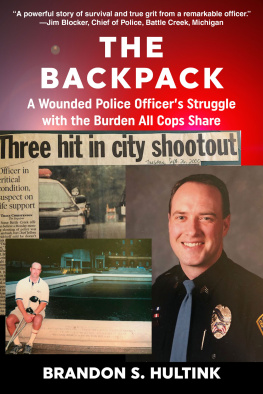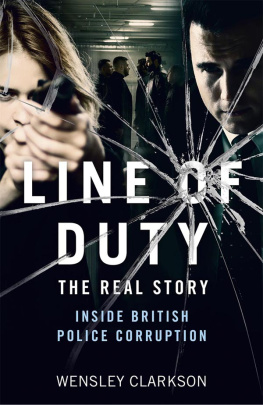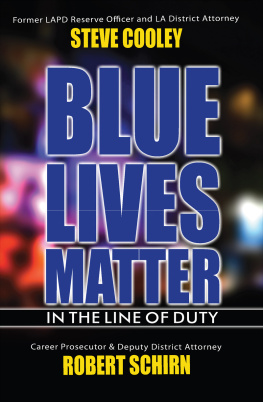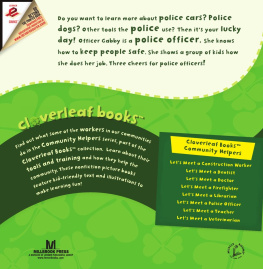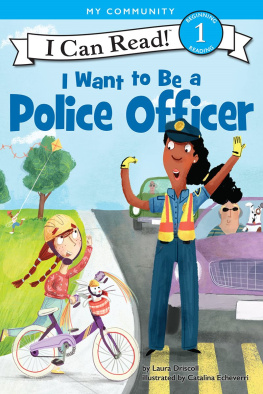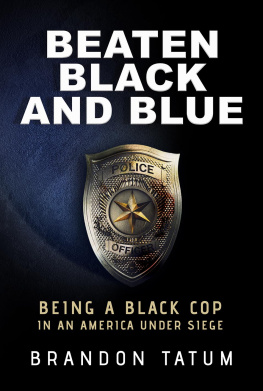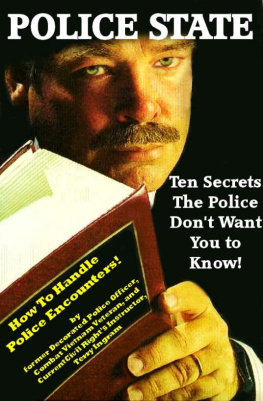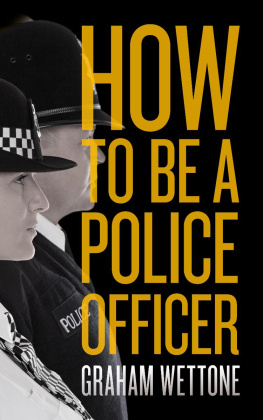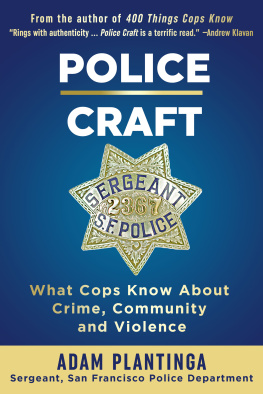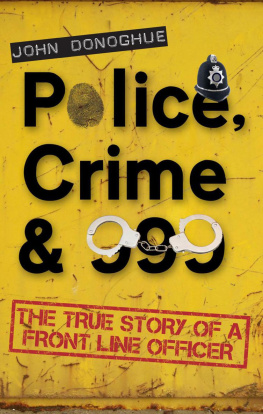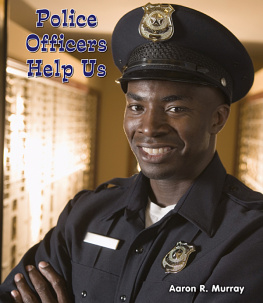
THE BACKPACK
A Wounded Police Officers
Struggle with the Burden
All Cops Share
by Brandon Hultink

The Backpack: A Wounded Police Officers Struggle with the Burden All Cops Share
Copyright 2020 by Brandon S. Hultink. All rights reserved.
Photographs courtesy of the author.
Published by Quill Driver Books, an imprint of Linden Publishing
2006 South Mary Street, Fresno, California 93721
(559)233-6633 / (800) 345-4447
QuillDriverBooks.com
Quill Driver Books and Colophon are trademarks of Linden Publishing, Inc.
ISBN 978-1-61035-351-9
135798642
Printed in the United States of America on acid-free paper.
Library of Congress Cataloging-in-Publication Data
Names: Hultink, Brandon, 1970- author.
Title: The backpack : a wounded police officers struggle with the burden all cops share / by Brandon Hultink.
Description: Fresno, California : Quill Driver Books, [2020] | Includes index. |
Summary: Wounded in the line of duty and paralyzed, police officer Brandon Hultink made an amazing journey from despair to hope. After the shoot-out that put him in a wheelchair, police officer Brandon Hultink was ready to put an end to it all. In his frank and compelling memoir The Backpack, Hultink tells how he came to the worst moment of his life, and how faith in God and the humility to accept help brought him out of depression, addiction, and the wheelchair and back into successful life. But Hultinks story isnt his alone?it is also the story of the thousands of police officers who struggle with depression and post-traumatic stress. An intensely personal story of anguish and survival, The Backpack offers hope to everyone, police and civilian alike, who struggles with depression and pain-- Provided by publisher.
Identifiers: LCCN 2020017388 (print) | LCCN 2020017389 (ebook) | ISBN 9781610353519 (paperback) | ISBN 9781610353694 (epub) | ISBN 9781610353694 (kindle edition)
Subjects: LCSH: Hultink, Brandon, 1970- | Police--Biography. | Police--Mental health. | Police--Suicidal behavior. | Police--Job stress.
Classification: LCC HV7936.S77 H85 2020 (print) | LCC HV7936.S77 (ebook) | DDC 363.2092 [B]--dc23
LC record available at https://lccn.loc.gov/2020017388
LC ebook record available at https://lccn.loc.gov/2020017389
DEDICATION
To Heff, a cops cop, who helped me through the storm.
To Jordan and Zac, whose smiling faces in the dark got me through it.
To Cody, truly my miracle son!
To Mom and Dad Hultink, who gave me the place to write and the encouragement to finish.
To JJ, who held my hand when I needed it most.
To all my family and loved ones, for giving me the strength to see tomorrow.
To all my brothers and sisters under the badge for all you do each day: be safe.
To Keri, my rock and the love of my life, thank you for carrying me when I could not walk.
I love you all and cherish each day with you. May God bless you all.
Brandon
CONTENTS
INTRODUCTION
I t has taken me over fifteen years to begin putting these thoughts down as words on paper. There are many reasons, but the main one is the very reason this book needed to be written: cops dont talk about their feelings about anything, ever. That is one of the biggest challenges facing every young police officer new to this profession. We see the worst of humanity, shift after shift, and refuse to process the trauma that pounds away at each of us relentlessly. We are the toughest of the tough when we exit our academies and first don the uniform. We start a career of showing each other as officers that each day, each week, and each year we are still tough enough to do the job. We spend our entire career showing how all the madness that we face daily does not affect us in any way. We believe we must show that we are robots of steelready at the drop of a hat to face the next mess to which we are called. Meanwhile, as we keep up our faade of invincibility, our core is breaking. We return home daily to the question How was your day? and simply answer Fine as we pour our first of many post-shift drinks. We refuse to let people outside our police community in, as day by day our strong exterior hides our crumbling inside.
The aftermath is devastating: divorce, suicide, substance abuse, domestic violence, depression, loneliness, and declining overall health. We start out as Spartan warriors fresh out of the academy and turn into shells of ourselves. But the dirty secret in police work is that nobody knows any of this is happening until its often too late to reverse the destructive course weve set for ourselves. Why? Why do police officers, most of them very skilled, intelligent people, allow themselves to become so self-destructive when their whole lives are devoted to solving other peoples problems? I didnt understand it when it was happening to me, and nobody told me about any of this when I was in the police academy.
The reason is so simple it almost defies logic: police officers will not discuss their feelings and emotions. Instead, they take the trauma and problems they face during their shifts and stuff these in the backpack that they each carry. Nobody on the job ever tells you this, but the things we refuse to process emotionally as police officers, and stuff into our backpacks, will have to be dealt with at some point. Each year we work as an officer, we see the worst parts of humanity that no person should have to see and add that to the weight of our backpack. Each time we end a shift in which a child was decapitated in a car accident or a teenager was raped and murdered and return home to answer Im fine to our spouse or companion, we add to the backpack.
The heavier it gets and the longer we are on the job, the more difficult it becomes to process what has happened to us. So, we turn to self-medication and isolation and share the few feelings we can only with fellow officers who understand us. These fellow officers are carrying their own backpacks and facing the same mountains each of us is climbing. Officers get together in bars, tell stories, and brag about how tough they were in the face of hundreds of calls; thats only a bandage on a growing wound.
Which brings me to this book. I have fought the urge to write this book for the same reasons I shoved a career of police work into my own backpack. But with the help and advice of many people both inside and outside the police world, I am still alive today to tell this story. This story needs to be told, but only if it can be told so that a police officer will truly understand it. This is my journey through a career in law enforcement, from the academy to the present. I will not hold back. I will let you inside a world that you have not been able to experience before and that will likely make you feel very uncomfortable at times. I am going to open myself up to you by telling you how my backpack was filled and how it affected me. I will let you know how I feel about a lot of things. I will expose the side of police work that people dont see and what officers face daily. Ive lost too many friends to suicide, poor health, and destructive behavior in the last several years, and I need to open this wound that each officer is facing. Its time to unzip my backpack.
DESPERATION
I can still remember the taste of metal in my mouth from the barrel of the gun. It was just after two oclock in the morning, and everyone was asleep upstairs. I kept my finger off the trigger, as I had been trained to do my entire career. But I didnt remove the barrel either. I just kept it in my mouth, feeling very lonely and tired. I remember my thoughts drifting to how my whole life Id been taught that suicide was a one-way ticket to hell. I pictured the devil and an eternity of fire on the other side waiting for me as soon as I pulled the trigger. It had been just over six months since I had been shot, and I was paralyzed from the waist down. Just a few months ago I was competing in triathlon races and starting to do well. I can still remember the feeling of running with the wind in my face, looking at my Ironman watch, and challenging myself with each practice run. I remember the mountain-bike trails and endless obstacles each trail posed as my bike cut through the woods. Tears began to well in my eyes as I realized I would never mountain bike or run again. I was now a cripple for life and Id better accept it, or so I kept being told.
Next page
